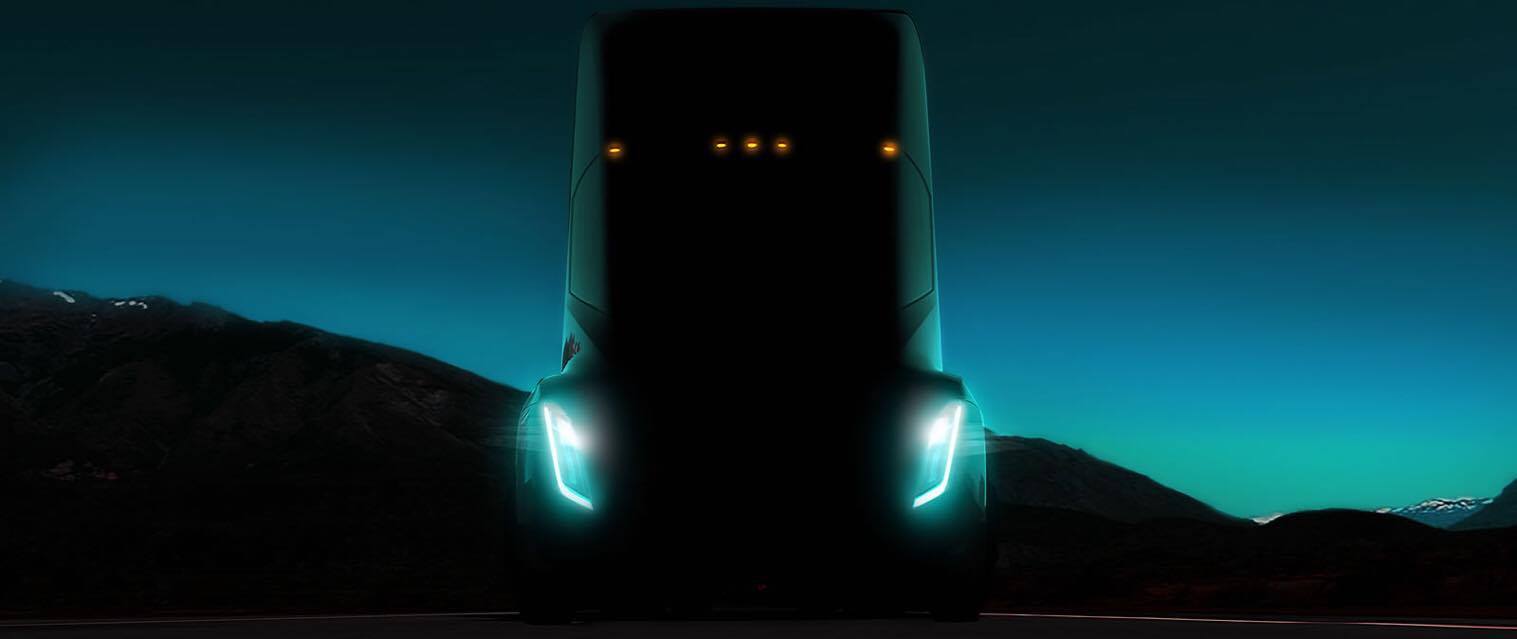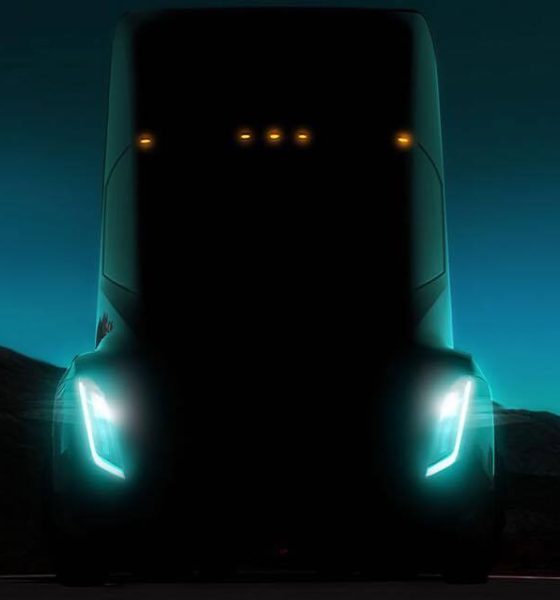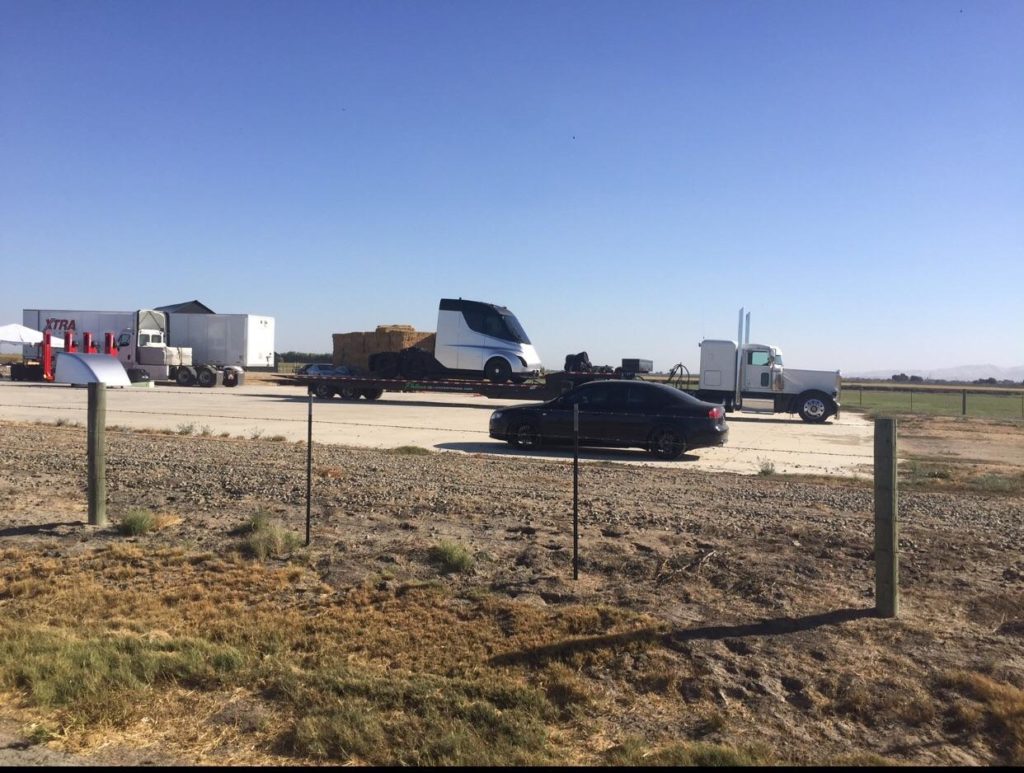

Investor's Corner
How Tesla’s Semi-truck could disrupt the commercial trucking industry
Tesla is already taking the world by storm with its fleet of consumer electric cars and the company’s push toward fully autonomous self-driving technology. Now, the Silicon Valley-based car maker and technology company has set its sights on the trucking industry, with the introduction of a fully electric semi-truck on the horizon. What will this mean to the trucking industry if Tesla succeeds?
Electric Semi-Trucks
With the official unveiling set for Oct. 26, Tesla fans and industry experts are speculating about the kind of impact its electric semi-truck could have on the commercial trucking industry as a whole.
The idea behind the Tesla Semi, which Elon Musk has affectionately called a “beast”, is to make it less expensive to operate than its gas and diesel counterparts on account of reduced maintenance, fuel, and insurance costs. This could result in operational cost reductions of 70% over existing trucks on the market, according to Adam Jonas of Morgan Stanley.
Tesla has also gathered billion of miles of driving data from the Autopilot hardware that’s equipped on its latest Model S and Model X vehicles. Using this vast dataset, Tesla aims to create a detailed 3D map of the world that will increasingly become more detailed as fleet data is collected. This dataset allows Tesla’s Vision and artificial intelligence team to train complex algorithms for its Full Self-Driving technology, which will one day allow Tesla’s fleet of consumer vehicles and its upcoming semi-truck to recognize traffic indicators, identify pedestrians and, overall, operate on near-parity with human decision making, before exceeding it.
ASLO SEE: Tesla Autopilot and artificial intelligence: The unfair advantage
Being able to offer this level of automation will be transformative for entire industries, including the commercial trucking segment. Companies that have traditionally built their shipping and logistics models based on human capabilities will be able to better manage their manpower costs, while increasing efficiency at safer levels across the organization through Tesla’s automation. Combined with the fact that a Tesla Semi will emit no tailpipe emissions, in a world where regulations on emission standards are becoming increasingly more strict and manufacturers are pushing to transition toward all-electric fleets, and the industry impact of Tesla’s semi-truck becomes even more clear.

Tesla’s Semi-truck spied ahead of its October 26, 2017 official unveiling event.
Execution
We’re still waiting for exact specifications for Tesla’s Semi like range and hauling capacity, but early reports by Reuters suggests that the electric truck will have a range between 200 and 300 miles. The relatively short range by long-haul trucking standards means that Tesla will likely target regional hauling. Any further than that would require a massive a battery that would be cost prohibitive for most companies looking to incorporate Tesla into its expense model.
Electric trucks might sound like a great innovation, but they aren’t without perils given current technology. First, electric trucks are going to require a new class of technicians to keep them primed and operating efficiently. Yes, Tesla cars are known to operate hundreds of thousands of miles without much trouble, but there’s no way to project how the wear and tear of the long haul will affect these new electric trucks.
Production will be the other big question. Tesla CEO Elon Musk is known to have an optimistic outlook when it comes to delivering his vision to the masses. But keeping to deadlines couldn’t be more important to a consumer and commercial goods industry that’s largely dependent on having a smooth running supply chain. Companies that commit to augmenting its business with a Tesla Semi or looking to transition in full to an all-electric fleet of trucks will certainly have less tolerance for delays than the general Model S, Model X, and Model 3 consumer market. This is especially the case for publicly traded companies.
Tune in on Teslarati as we bring you coverage on all Tesla Semi developments. And be sure to follow us @Teslarati or like us on Facebook to see live behind the scenes coverage from the Tesla Semi event on October 26.

Investor's Corner
Tesla gets tip of the hat from major Wall Street firm on self-driving prowess
“Tesla is at the forefront of autonomous driving, supported by a camera-only approach that is technically harder but much cheaper than the multi-sensor systems widely used in the industry. This strategy should allow Tesla to scale more profitably compared to Robotaxi competitors, helped by a growing data engine from its existing fleet,” BoA wrote.

Tesla received a tip of the hat from major Wall Street firm Bank of America on Wednesday, as it reinitiated coverage on Tesla shares with a bullish stance that comes with a ‘Buy’ rating and a $460 price target.
In a new note that marks a sharp reversal from its neutral position earlier in 2025, the bank declared Tesla’s Full Self-Driving (FSD) technology the “leading consumer autonomy solution.”
Analysts highlighted Tesla’s camera-only architecture, known as Tesla Vision, as a strategic masterstroke. While technically more challenging than the multi-sensor setups favored by rivals, the vision-based approach is dramatically cheaper to produce and maintain.
This cost edge, combined with Tesla’s rapidly expanding real-world data engine, positions the company to scale robotaxis far more profitably than competitors, BofA argues in the new note:
“Tesla is at the forefront of autonomous driving, supported by a camera-only approach that is technically harder but much cheaper than the multi-sensor systems widely used in the industry. This strategy should allow Tesla to scale more profitably compared to Robotaxi competitors, helped by a growing data engine from its existing fleet.”
The bank now attributes roughly 52% of Tesla’s total valuation to its Robotaxi ambitions. It also flagged meaningful upside from the Optimus humanoid robot program and the fast-growing energy storage business, suggesting the auto segment’s recent headwinds, including expired incentives, are being eclipsed by these higher-margin opportunities.
Tesla’s own data underscores exactly why Wall Street is waking up to FSD’s potential. According to Tesla’s official safety reporting page, the FSD Supervised fleet has now surpassed 8.4 billion cumulative miles driven.
Tesla FSD (Supervised) fleet passes 8.4 billion cumulative miles
That total ballooned from just 6 million miles in 2021 to 80 million in 2022, 670 million in 2023, 2.25 billion in 2024, and a staggering 4.25 billion in 2025 alone. In the first 50 days of 2026, owners added another 1 billion miles — averaging more than 20 million miles per day.
This avalanche of real-world, camera-captured footage, much of it on complex city streets, gives Tesla an unmatched training dataset. Every mile feeds its neural networks, accelerating improvement cycles that lidar-dependent rivals simply cannot match at scale.
Tesla owners themselves will tell you the suite gets better with every release, bringing new features and improvements to its self-driving project.
The $460 target implies roughly 15 percent upside from recent trading levels around $400. While regulatory and safety hurdles remain, BofA’s endorsement signals growing institutional conviction that Tesla’s data advantage is not hype; it’s a tangible moat already delivering billions of miles of proof.
Elon Musk
SpaceX IPO could push Elon Musk’s net worth past $1 trillion: Polymarket
The estimates were shared by the official Polymarket Money account on social media platform X.

Recent projections have outlined how a potential $1.75 trillion SpaceX IPO could generate historic returns for early investors. The projections suggest the offering would not only become the largest IPO in history but could also result in unprecedented windfalls for some of the company’s key investors.
The estimates were shared by the official Polymarket Money account on social media platform X.
As noted in a Polymarket Money analysis, Elon Musk invested $100 million into SpaceX in 2002 and currently owns approximately 42% of the company. At a $1.75 trillion valuation following SpaceX’s potential $1.75 trillion IPO, that stake would be worth roughly $735 billion.
Such a figure would dramatically expand Musk’s net worth. When combined with his holdings in Tesla Inc. and other ventures, a public debut at that level could position him as the world’s first trillionaire, depending on market conditions at the time of listing.
The Bloomberg Billionaires Index currently lists Elon Musk with a net worth of $666 billion, though a notable portion of this is tied to his TSLA stock. Tesla currently holds a market cap of $1.51 trillion, and Elon Musk’s currently holds about 13% to 15% of the company’s outstanding common stock.
Founders Fund, co-founded by Peter Thiel, invested $20 million in SpaceX in 2008. Polymarket Money estimates the firm owns between 1.5% and 3% of the private space company. At a $1.75 trillion valuation, that range would translate to approximately $26.25 billion to $52.5 billion in value.
That return would represent one of the most significant venture capital outcomes in modern Silicon Valley history, with a growth of 131,150% to 262,400%.
Alphabet Inc., Google’s parent company, invested $900 million into SpaceX in 2015 and is estimated to hold between 6% and 7% of the private space firm. At the projected IPO valuation, that stake could be worth between $105 billion and $122.5 billion. That’s a growth of 11,566% to 14,455%.
Other major backers highlighted in the post include Fidelity Investments, Baillie Gifford, Valor Equity Partners, Bank of America, and Andreessen Horowitz, each potentially sitting on multibillion-dollar gains.
Elon Musk
Elon Musk hints Tesla investors will be rewarded heavily
“Hold onto your Tesla stock. It’s going to be worth a lot, I think. That’s my bet,” Musk said.

Elon Musk recently hinted that he believes Tesla investors will be rewarded heavily if they continue to hold onto their shares, and he reiterated that in a new interview that the company released on its social accounts this week.
Musk is one of the most successful CEOs in the modern era and has mammothed competitors on the Forbes Net Worth List over the past year as his holdings in his various companies have continued to swell.
Tesla investors, especially those who have been holding shares for several years, have also felt substantial gains in their portfolios. Over the past five years, the stock is up over 78 percent. Since February 2019, nearly seven years ago to the day, the stock is up over 1,800 percent.
Musk said in the interview:
“Hold onto your Tesla stock. It’s going to be worth a lot, I think. That’s my bet.”
Elon Musk in new interview: “Hold on to your $TSLA stock. It’s going to be worth a lot, I think. That’s my bet.” pic.twitter.com/cucirBuhq0
— Sawyer Merritt (@SawyerMerritt) February 26, 2026
It’s no secret Musk has been extremely bullish on his own companies, but Tesla in particular, because it is publicly traded.
However, the company has so many amazing projects that have an opportunity to revolutionize their respective industries. There is certainly a path to major growth on Wall Street for Tesla through its various future projects, including Optimus, Cybercab, Semi, and Unsupervised FSD.
- Optimus (Tesla’s humanoid robot): Musk has discussed its potential for tasks like childcare, walking dogs, or assisting elderly parents, positioning it as a massive long-term driver of company value.
- Cybercab (Tesla’s robotaxi/autonomous ride-hailing vehicle): a fully autonomous vehicle geared specifically for Tesla’s ride-sharing ambitions.
- Semi (Tesla’s electric truck, with mentions of expansion, like in Europe): brings Tesla into the commercial logistics sector.
- Unsupervised FSD (Full Self-Driving software achieving full autonomy without human supervision): turns every Tesla owner’s vehicle into a fully-autonomous vehicle upon release
These projects specifically are some of the highest-growth pillars Tesla has ever attempted to develop, especially in Musk’s eyes, as he has said Optimus will be the best-selling product of all-time.
Many analysts agree, but the bullish ones, like Cathie Wood of ARK Invest, are perhaps the one who believes Tesla has incredible potential on Wall Street, predicting a $2,600 price target for 2030, but this is not even including Optimus.
She told Bloomberg last March that she believes that the project will present a potential additive if Tesla can scale faster than anticipated.








